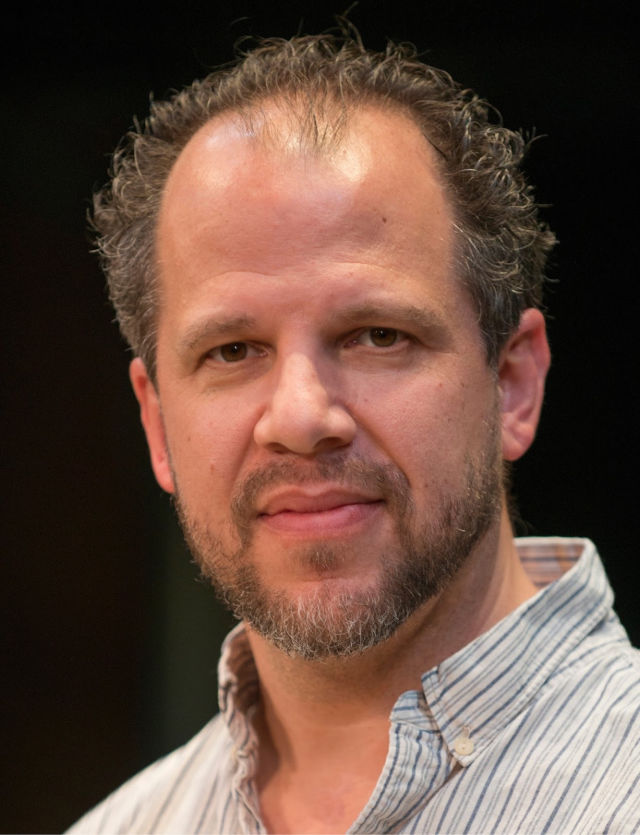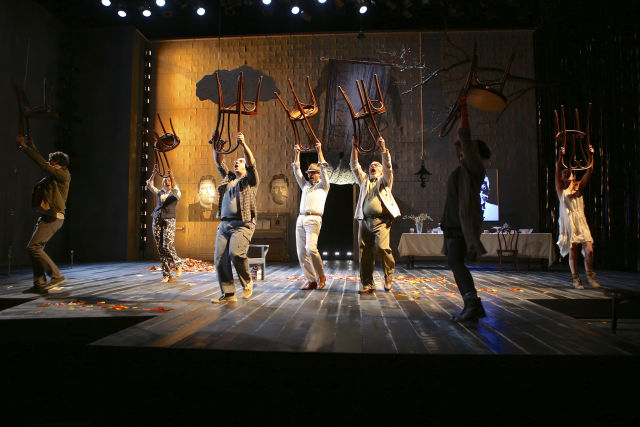Oregon-Born Playwright Aaron Posner Gives Chekhov the Bird

Image: Portland Center Stage
Once upon a time, Aaron Posner wrote reverent adaptations—theatrical adaptations of plays and books he says he would have proudly shown to the original author. Portland audiences have seen several of these, including his versions of The Chosen and Sometimes a Great Notion at Portland Center Stage, and And So It Goes, an adaptation of Kurt Vonnegut’s short stories at Artists Repertory Theatre.
These days, the Eugene-born playwright has moved onto his so-called “irreverent adaptations,” and the show that launched this phase is finally hitting local stages. Portland Center Stage is about to open Stupid Fucking Bird, which is Posner’s profanity-filled riff on Anton Chekhov’s The Seagull. PCS is bringing in the 2013 premiere production from Washington, DC’s Woolly Mammoth Theatre Company, with five of the seven original cast members. The Washington Post called it a “savvy, petulant blitz … less an adaptation of Chekhov’s landmark drama than a funny, moving slugfest, a ripe mashup of mock and awe.”
We caught up with Posner—who was raised in Oregon but now lives in DC—about the day-to-day struggles of existence, the influence of the Oregon Shakespeare Festival on his career in theater, and the Chekhovian nature of Friday Night Lights.
What’s stood out to you as you’ve seen Stupid Fucking Bird develop?
I’ve seen it in large theaters, small theaters, one college production. The thing I’m proudest of is that there’s a kind of authenticity or core humanity that people seem really able to relate to—both the artists involved and the audiences. Even in very different circumstances and with different takes on the characters, I keep hearing the story clearly. And that’s obviously the great foundation Chekhov laid—the core setup of these mismatched loves and all of this passion and all of this desire for each other in odd combinations. But I feel like I really try to tell the truth about what I understand about the world, and about love and about struggle and about very core issues of our humanity. I tried to write about that with as much transparency and authenticity as I knew how, and I’ve been very gratified that tends to come through in the productions.
What are some of these truths you’re trying to convey?
There’s a famous quote of Chekhov’s: “Any idiot can face a crisis. It’s the day-to-day living that wears you out.” The stakes are enormously high in Chekhov’s plays—there are great big passions and great big loves—but it’s still very day-to-day. These are normal people undergoing this really difficult struggle of just being a human being—trying to deal with being poor, or trying to deal with having a mother who doesn’t love you the way you’d like her to love you, or loving a girl who doesn’t love you back or who loves your friend, or not being successful at work. These are not rarefied; these are not the stories of kings and princes. It’s not escapism into other worlds. I love that too, but that’s Shakespeare. This is the day-to-day struggle of how hard life is and how tricky it can be to get through each day. People see themselves reflected up there, and that’s what’s been really gratifying.
What originally drew you to Chekhov?
I’ve always loved Chekhov. His plays are so brilliant. They were a game-changer 100 years ago—they shifted everything. But of course they’ve been imitated by virtually everyone for the last 100 years, particularly by film and television, which is the domain of realism. So what was once radical, when Chekhov wrote them, is now so radically not radical. It’s mundane. It’s exactly what you’re used to seeing—horribly in a soap opera, or wonderfully in the great dramas like Friday Night Lights. That’s a spectacularly good show, but these are just normal people trying to play football and get along in their small town in Texas. That’s a very Chekhovian world. I was interested in seeing if it wasn’t possible to re-radicalize it by being more theatrically playful or experimental. So my play isn’t told in a realistic way, and there’s a lot of connection with the audience—these are theatrical structures that are not traditional.

The cast of the Woolly Mammoth production of Stupid Fucking Bird.
Image: Mike Davis
What was the writing process like?
I didn’t craft out the whole thing. It wasn’t theoretical writing—I wrote a lot of it rapidly and impulsively. There’s one little scene towards the end of the play—a scene I’m actually very proud of—that I wrote when we did a workshop at the Lake George Theater Lab. We knew we needed to replace the last scene. I got an idea in the middle of the night after my young daughter had woken me up. I wrote the whole scene with her in my left arm, typing with my right arm. It took a long time, but that whole scene has remained. Something kind of wonderful happened that night. I had to type very slowly because I only had one hand. Maybe something about the speed allowed me to go a little deeper. I should probably do more of it.
Was that kind of impulsive writing unusual for you?
I’ve written many more adaptations that were what I’d now call reverent adaptations—Sometimes a Great Notion, or The Chosen, both of which have been at Portland Center Stage. Or even And So It Goes, the Kurt Vonnegut stories. Those were all adaptations in which I would have been very proud to show it to the originating author and say, “Look how well I have served you.” My goal was, yes, to bring my own voice to it, but really to serve the originating author—that was at the center of my mission.
With Stupid Fucking Bird, that is not at all the case. I have no desire at all to serve Chekhov. Not that I don’t love him, but that's simply the playground. It’s my own perspective; it’s my own point of view. Stupid Fucking Bird was the beginning of what I now call my irreverent adaptations, where I’m subverting or using—I hope in a nice way—the originating author. It was a play I wrote impulsively and passionately and very much for myself—I wasn’t sure it would ever get produced. I kept the title partially because I didn’t want to compromise.
What’s next?
I will complete the four major Chekhov plays. It’s been so much fun and has inspired me. My adaptation of Uncle Vanya, called Life Sucks (Or, the Present Ridiculous), premiered last year in DC, and my next one is called No Sisters, and it’s my adaptation of Three Sisters. And I’ll do The Cherry Orchard.
I’m also working on one called District Merchants, which is Shakespeare’s Merchant of Venice, but it’s set in Washington, DC in the 1870s. It’s using the bones of Shakespeare, but really as an opportunity for me to explore things. It’s sort of an adaptation, and it’s sort of an original play. I’m certainly in my irreverent phase at the moment.
Any plans to move closer to an original play?
I’m working on a commission about John Quincy Adams, which still has historical figures in it, but it’s not an adaptation of an existing work.
Early American history—so hot right now. Is it a musical too?
I’m not that stupid. I had this idea for JQA, as I’m calling it, before I’d ever even heard of Hamilton. Shakespeare is the only comparison I can make to Lin-Manuel Miranda. I would like to stay away from any comparison, because I would lose, and I would lose badly.
You left Oregon after high school, and you haven't lived here since. Do you still feel a connection to this state?
The truth is, and not just for the purpose of this interview, I still strongly identify as an Oregonian. That ex-hippie, granola-oriented Oregon upbringing still feels very much in my fabric. Growing up, I remember seeing things at the University of Oregon. But mostly it was Ashland and going to the Oregon Shakespeare Festival. My parents started taking me there when I was seven or eight. I saw so many productions there. Ashland remains important to me. I go often still, and I hope to work there someday. It’s a magical, remarkable place. I do a lot of Shakespeare, and that was a love and a passion I developed going to those shows—and not just Shakespeare, but seeing so many great productions growing up. Ashland is a special place in the world, and it has a big place in my heart.
Over the years, actors I recognized from growing up there have come in and auditioned for me. And I remember the first time it happening, I went, “Who am I to judge you? You’re from Ashland!” Like, how do I deserve this honor? It was a very odd dynamic.
Stupid Fucking Bird is at the Gerding Theater Feb 27-March 27.
